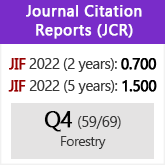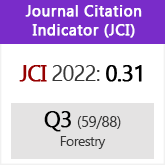Modelling modulus of elasticity of Pinus pinaster Ait. in northwestern Spain with standing tree acoustic measurements, tree, stand and site variables
Abstract
Aim of study: Modelling the structural quality of Pinus pinaster Ait. wood on the basis of measurements made on standing trees is essential because of the importance of the species in the Galician forestry and timber industries and the good mechanical properties of its wood. In this study, we investigated how timber stiffness is affected by tree and stand properties, climatic and edaphic characteristics and competition.
Area of study: The study was performed in Galicia, north-western Spain.
Material and methods: Ten pure and even-aged P. pinaster stands were selected and tree and stand variables and the stress wave velocity of 410 standing trees were measured. A sub-sample of 73 trees, representing the variability in acoustic velocity, were felled and sawed into structural timber pieces (224) which were subjected to a bending test to determine the modulus of elasticity (MOE).
Main results: Linear models including wood properties explained more than 97%, 73% and 60% of the observed MOE variability at site, tree and board level, respectively, with acoustic velocity and wood density as the main regressors. Other linear models, which did not include wood density, explained more than 88%, 69% and 55% of the observed MOE variability at site, tree and board level, respectively, with acoustic velocity as the main regressor. Moreover, a classification tree for estimating the visual grade according to standard UNE 56544:2011 was developed.
Research highlights: The results have demonstrated the usefulness of acoustic velocity for predicting MOE in standing trees. The use of the fitted equations together with existing dynamic growth models will enable preliminary assessment of timber stiffness in relation to different silvicultural alternatives used with this species.
Keywords: stress wave velocity, modulus of elasticity, site index, competition index, stepwise regression, CART.
Downloads
References
AENOR, 2006. Eurocode 5: Design of timber structures – Part 1-1: General-Common rules and rules for buildings. AENOR, Madrid, Spain.
AENOR, 2011. UNE 56544:2011. Visual grading for structural sawn timber. Coniferous timber. AENOR, Madrid, Spain.
AENOR, 2012. UNE-EN 408:2011. Timber structures – Structural timber and glued laminated timber – Determination of some physical and mechanical properties. AENOR, Madrid, Spain.
Álvarez González JG, Ruiz González AD, Rodríguez Soalleiro RJ, Barrio Anta M, 2005. Ecoregional site index models for Pinus pinaster in Galicia (northwestern Spain). Ann For Sci 62: 115-127. http://dx.doi.org/10.1051/forest:2005003
Biblis EJ, Carino H, Brinker R, McKee CW, 1995. Effect of stand density on flexural properties of lumber from two 35-year-old Loblolly pine plantations. Wood Fiber Sci 27: 25-33.
Blake GR, Hartge KH, 1986. Bulk Density. In: Methods of soil analysis, Part I. Physical and mineralogical methods, 2nd ed (Klute A, ed). Agronomy Monograph n° 9. pp: 363-375.
Breiman L, Friedman JH, Olshen RA, Stone CJ, 1984. Classification and regression trees. Chapman & Hall, New York, USA. 359 pp.
Carballo J, Hermoso E, Fernández-Golfín JI, 2009. Mechanical properties of structural maritime pine sawn timber from Galicia (Pinus pinaster Ait. ssp. atlantica). Invest Agrar Sist Recur For 18, 152-158.
Carter P, Briggs D, Ross RJ, Wang X, 2005. Acoustic testing to enhance western forest values and meet customer wood quality needs. USDA Forest Service General Technical Reports PNW 642, 121-129.
Chuang ST, Wang SY, 2001. Evaluation of standing tree quality of Japanese cedar grown with different spacing using stress-wave and ultrasonic-wave methods. J Wood Sci 47, 245-253. http://dx.doi.org/10.1007/BF00766709
Daniels RF, Burkhart HE, Clason TR, 1986. A comparison of competition measures for predicting growth of loblolly pine trees. Can J For Res 16: 1230-1237. http://dx.doi.org/10.1139/x86-218
Der G, Everitt BS, 2002. A handbook of statistical analysis using SAS, 2nd ed. Chapman & Hall, CRC. 392 pp.
Deresse T, Shepard RK, Shaler SM, 2003. Microfibril angle variation in red pine (Pinus resinosa Ait.) and its relation to the strength and stiffness of early juvenile wood. Forest Prod J 53: 34-40.
Gaspar MJ, Louzada JL, Aguiar A, Almeida MH, 2008a. Genetic correlations between wood quality traits of Pinus pinaster Ait. Ann For Sci 65: 703. http://dx.doi.org/10.1051/forest:2008054
Gaspar MJ, Louzada JL, Silva ME, Aguiar A, Almeida MH, 2008b. Age trends in genetic parameters of wood density components in 46 half-sibling families of Pinus pinaster Ait. Can J For Res 38: 1470-1477. http://dx.doi.org/10.1139/X08-013
Gentner R, 1985. Appréciation non destructive de la qualité du bois d'arbres sur pied: cas de l'épicéa de Sitka [Picea sitchensis (Bong.) Carr.], rapport ERQB Inra Nancy, ENITEF, France. 98 pp.
Greenhill AG, 1881. Determination of the greatest height consistent with stability that a vertical pole or mast can be made, and of the greatest height to which a tree of given proportions can grow. Proc Camb Philos Soc 4: 65-73.
Haartveit EY, Flate PO, 2002. Mechanical properties of Norway spruce lumber from monocultures and mixed stand – modeling bending stiffness and strength using stand and tree characteristics. In: connection between silviculture and wood quality: modeling approach and simulation software, IUFROWP S5.01-04Workshop (Springs HH, ed). British Columbia, Canada, September.
Hegyi F, 1974. A simulation model for managing jackpine stands. In: Growth models for tree and stand simulation. Proc IUFRO meeting S4.01.04 (Fries J, ed). Royal College of Forestry, Stockolm, Sweden. pp: 74-90.
Ikonen VP, Peltola H, Wilhelmsson L, Kilpeläinen A, Väisänen H, Nuutinen T, Kellomäki S, 2008. Modelling the distribution of wood properties along the stems of Scots pine (Pinus sylvestris L.) and Norway spruce (Picea abies (L.) Karst.) as affected by silvicultural management. For Ecol Manage 256: 1356-1371.
Ishiguri F, Matsui R, Iizuka K, Yokota S, Yoshizawa N, 2008. Prediction of the mechanical properties of lumber by stress-wave velocity and Pilodyn penetration of 36-yearold Japanese larch trees. Holz Roh Werkst 66: 275-280. http://dx.doi.org/10.1007/s00107-008-0251-7
Kliger IR, Perstorper M, Johansson G, Pellicane PJ, 1995. Quality of products from Norway spruce. Part 3. Influence of spatial position and growth characteristics on bending stiffness and strength. Wood Sci Technol 29: 397-410.
Lasserre JP, Mason E, Watt M, 2004. The influence of initial stocking on corewood stiffness in a clonal experiment of 11-year-old Pinus radiata D. Don. New Zeal J For 49: 18-23.
Lasserre JP, Mason E, Watt M, 2005. The effects of genotype and spacing on Pinus radiata (D. Don) corewood stiffness in a 11 year old experiment. For Ecol Manage 205: 375-383.
Lasserre JP, Mason E, Watt M, 2008. Influence of the main and interactive effects of site, stand stocking and clone on Pinus radiata D. Don corewood modulus of elasticity. For Ecol Manage 255: 3455-3459.
Lei YC, Zhang SY, Jiang Z, 2005. Models for predicting lumber bending MOR and MOE based on tree and stand characteristics in black spruce. Wood Sci Technol 39: 37-47. http://dx.doi.org/10.1007/s00226-004-0269-x
Liu C, Zhang SY, Cloutier A, Rycabel T, 2007. Modeling lumber bending stiffness in natural black spruce stands using stand and tree characteristics. For Ecol Manage 242: 648-655.
Martin GL, Ek AR, 1984. A comparison of competition measures and growth models for predicting plantation red pine diameter and height growth. For Sci 30: 731-743.
Mehlich A, 1984. Mehlich 3 soil test extractant: a modification of Mehlich 2 extractant. Comm Soil Sci Plant An 15: 1409-1416. http://dx.doi.org/10.1080/00103628409367568
Merlo E, Zas R, Piñeiro G, Pedras F, 2008. Variabilidad de parámetros de calidad de madera entre y dentro de procedencias de Pseudotsuga menziesii. Cuadernos de la Sociedad Espa-ola de Ciencias Forestales 24: 262-266.
Merlo E, Santaclara O, Pedras XF, 2009. Relationship between stress-wave velocity of standing tree and wood quality in 27 year old Douglas-fir. In: 16th International nondestructive testing and evaluation of wood symposium, WOOD NDT, Beijing, China, December.
Moore JR, Lyon AJ, Searles GJ, Vihermaa LE, 2009. The effects of site and stand factors on the tree and wood quality of Sitka spruce growing in the United Kingdom. Silva Fenn 43: 383-396. http://dx.doi.org/10.14214/sf.195
Moore JR, Lyon AJ, Searles GJ, Lehneke SA, Ridley-Ellis DJ, 2013. Within-and between-stand variation in selected properties of Sitka spruce sawn timber in the UK: implications for segregation and grade recovery. Ann Sci For 70: 403-415. http://dx.doi.org/10.1007/s13595-013-0275-y
Mothe F, Duchanois G, Zannier B, Leban JM. 1998. Microdensitometric analysis of wood samples: data computation method used at INRA-ERQB (CERD programme). Ann Sci For 55: 301-313. http://dx.doi.org/10.1051/forest:19980303
Polge H, 1966. Établissement des courbes de variation de la densité du bois par exploration densitométrique de radiographies d'échantillons prélevés à la tarière sur des arbres vivants. Application dans les domaines technologiques et physiologiques. Doctoral thesis. Université de Nancy, France.
Pukkala T, Kolström T, 1987. Competition indices and the prediction of radial growth in Scots pine. Silva Fenn 21: 55-67. http://dx.doi.org/10.14214/sf.a15463
R Development Core Team, 2011. R: a language and environment for statistical computing. R Foundation for Statistical Computing, Vienna, Austria. http://www.R-project.org/
Riesco G, Díaz González J, 2007. Características físicas de la madera de pino procedente de raleos en el noroeste de Espa-a. Maderas. Ciencia y Tecnología 9: 233-244.
Rodríguez Guitián MA, 2004. Aplicación de criterios botánicos para a proposta de modelos de xestión sustentable das masas arborizadas autóctonas do Subsector Galaico- Asturiano Septentrional. Doctoral thesis. University of Santiago de Compostela, Spain.
Roth BE, Li X, Huber DA, Peter GF, 2007. Effects of management intensity, genetics and planting density on wood stiffness in a plantation of juvenile loblolly pine in the southeastern USA. For Ecol Manage 246: 155-162.
Rozenberg P, 2001 Contribution à l'étude de la variabilité génétique des propriétés du bois chez Picea abies (L.) Karst et Pseudotsuga menziesii (Mirb.) Franco. Doctoral thesis. ENGREF, INRA, Orléans, France.
Rozenberg P, Franc A, Mamdy C, Launay J, Schermann N, Bastien JC, 1999. Genetic control of stiffness of standing Douglas fir; from the standing stem to the standardised wood sample, relationships between modulus of elasticity and wood density parameters. Part II. Ann For Sci 56: 145-154. http://dx.doi.org/10.1051/forest:19990206
Santaclara O, Álvarez JG, Merlo E, 2011. Modeling structural lumber quality for Pinus pinaster Ait. in northwestern Spain using standing tree acoustic assessment, stand variables and tree characteristics. In: 17th International nondestructive testing and evaluation of wood symposium, WOOD NDT. Sopron, Hungary, September. pp: 127-134.
SAS Institute Inc, 2004. SAS/STAT© 9.1 User's Guide. Cary, NC: SAS Institute Inc, 283 pp.
Takata K, Hirakawa Y, 1996. Variation in growth ring parameters among Japanese larch from different provenances. In: Recent advances in wood anatomy (Donaldson LA, Singh A, Butterfield BG, Whitehouse LJ, eds). Proceedings of the Third Pacific Regional Wood Anatomy Conference, Rotorua. pp: 351-356.
Therneau TM, Atkinson B, 2012. Package rpart. Version 3.1- 52. http://cran.r-project.org/web/packages/rpart/index.html Accessed 27 May 2013.
Walford GB, 1985. The mechanical properties of New Zealand- growth radiata pine for export to Australia. FRI Bulletin 93. Forest Research Institute, New Zealand Forest Service. 27 pp.
Waghorn MJ, Watt MS, Mason EG, 2007a. Influence of tree morphology, genetics, and initial stand density on outerwood modulus of elasticity of 17- year-old Pinus radiata. Forest Ecol Manage 244: 86-92. http://dx.doi.org/10.1016/j.foreco.2007.03.057
Waghorn MJ, Mason EG, Watt MS, 2007b. Influence of initial stand density and genotype on longitudinal variation in modulus of elasticity for 17-year-old Pinus radiata. Forest Ecol Manage 252: 67-72. http://dx.doi.org/10.1016/j.foreco.2007.06.019
Wang SY, Ko CY, 1998. Dynamic modulus of elasticity and bending properties of large beams of Taiwan-grown Japanese cedar from different plantation spacing sites. J Wood Sci 44: 62-68. http://dx.doi.org/10.1007/BF00521876
Wang X, Ross RJ, Mattson JA, Erickson JR, Forsman JW, Geske EA, Wehr MA, 2001a. Several nondestructive evaluation techniques for assessing stiffness and MOE of small-diameter logs. Res Pap FPL-RP-600. U. Department of agriculture, Forest Service, Forest Products Laboratory, Madison, WI, USA. 12 pp.
Wang X, Ross RJ, McClellan M, Barbour RJ, Erickson JR, Forsman JW, McGinnis GD, 2001b. Nondestructive evaluation of standing trees with a stress wave method. Wood Fiber Sci 33: 522-533
Wang X, Ross RJ, Brashaw BK, Erickson JR, Forsman JW, Pellerin R, 2002. Diameter effect on stress-wave evaluation of modulus of elasticity of logs. In: Proceedings of the 13th International Symposium on Non-destructive Testing of Wood (Beall FC, ed). Forest Products Society, Madison, WI, USA. pp: 149-156.
Wang X, Ross RJ, Carter P, 2007. Acoustic evaluation of wood quality in standing trees. Part I. Acoustic wave behavior. Wood and Fiber Sci 39(1): 28-38.
Watt MS, Moore JR, Façon JP, Downes GM, Clinton PW, Coker G, Davis MR, Simcock R, Parfitt RL, Dando J, Mason EG, Bown HE, 2006. Modelling the influence of stand structural, edaphic and climatic influences on juvenile Pinus radiata dynamic modulus of elasticity. For Ecol Manage 229: 136-144.
Watt MS, Clinton PW, Coker G, Davis MR, Simcock R, Parfitt RL, Dando J, 2008. Modelling the influence of environment and stand characteristics on basic density and modulus of elasticity for young Pinus radiata and Cupressus lusitanica. For Ecol Manage 255: 1023-1033.
Wykoff WR, Crookston NL, Stage AR, 1982. User's guide to the stand prognosis model. Int For and range Exp Sta Gen Tech Rep INT-133.
Zhang SY, Chauret G, Ren HQ, Desjardins R, 2002. Impact of initial spacing on plantation black spruce lumber grade yield, bending properties, and MSR yield. Wood Fiber Sci 34: 460-475.
© CSIC. Manuscripts published in both the printed and online versions of this Journal are the property of Consejo Superior de Investigaciones Científicas, and quoting this source is a requirement for any partial or full reproduction.
All contents of this electronic edition, except where otherwise noted, are distributed under a “Creative Commons Attribution 4.0 International” (CC BY 4.0) License. You may read here the basic information and the legal text of the license. The indication of the CC BY 4.0 License must be expressly stated in this way when necessary.
Self-archiving in repositories, personal webpages or similar, of any version other than the published by the Editor, is not allowed.















